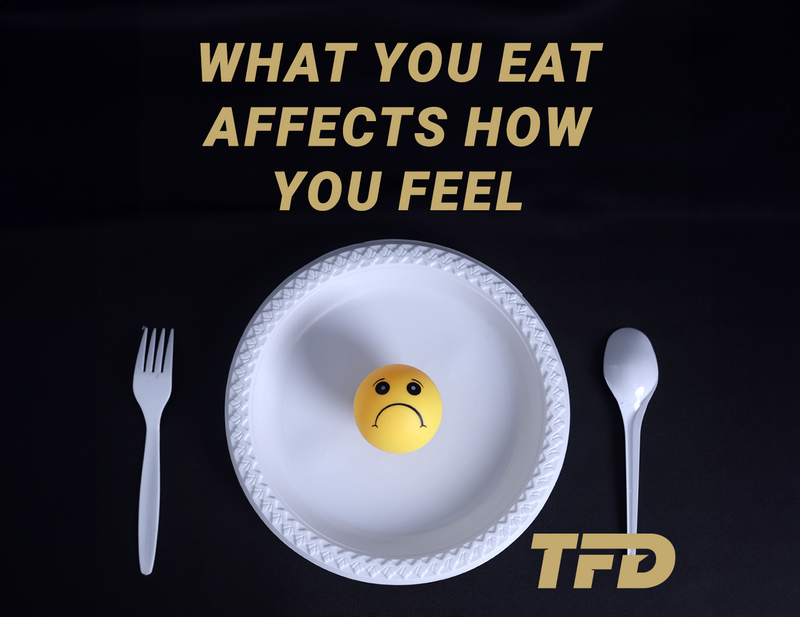
An area I have become increasingly interested in is what is called ‘nutritional psychiatry’, or put simply, how food interacts to help our mental health. In today’s world, this growing area of research is more important than ever. With societal and occupational pressure at their peak, there has never been a better time to discuss the current evidence on how dietary choices can affect mental health through numerous pathways in the body.
The Gut-Brain Axis
Research in recent years has highlighted the gut-brain axis as a critical link between diet and mental health, suggesting that the gut microbiome influences the brain via immune, endocrine, and nervous system interactions. Studies show that the gut microbiome composition can affect neurotransmitter synthesis, immune function, and inflammatory processes that impact mental health.
The gut microbiota, for example, produces neurotransmitters like gamma-aminobutyric acid (GABA) and serotonin, which are central to mood regulation (Cryan et al., 2019). In turn, diets high in fibre, which serves as a substrate for gut bacteria, have been shown to positively impact mental health outcomes by maintaining a diverse and balanced gut microbiome (Sonnenburg & Sonnenburg, 2019).
Further, dietary fiber increases the production of short-chain fatty acids (SCFAs), such as butyrate, which have demonstrated anti-inflammatory properties and influence the blood-brain barrier’s integrity. Studies have shown that SCFAs can improve resilience against stress and reduce symptoms of anxiety and depression (Dalile et al., 2019). Foods like fruits, vegetables, legumes, and whole grains are rich in fiber and can, therefore, play a significant role in maintaining a gut environment conducive to mental well-being.
Key takeaway? Look after your gut microbiome and it will look after you! Think seasonal, colourful, fruits, vegetables and wholegrains to hit 35g of fibre per day.
Brain Health and Mental Well-Being
There are a number of nutrients that are showing promise in the research to benefit our mental health, these include;
-
Omega-3 Fatty Acids
Particularly EPA and DHA, are essential for brain structure and function. A meta-analysis by Grosso et al. (2014) found that omega-3 intake is associated with a lower risk of depression, likely due to its role in neurotransmitter function and anti-inflammatory effects. Dietary sources of omega-3s, such as fatty fish and certain seeds, are beneficial for mental health. Men with low dietary intake of omega-3s may be more susceptible to mood disorders due to impaired brain cell membrane function and heightened inflammation. -
B Vitamins
Are vital for neurotransmitter production and nerve function. For example, vitamins B6 and B12 support the synthesis of serotonin, dopamine, and norepinephrine—neurotransmitters linked to mood and emotional regulation (Huskisson et al., 2007). Additionally, a folate deficiency (B9) is associated with an increased risk of depression and cognitive decline (Coppen & Bolander-Gouaille, 2005). Foods like leafy greens, eggs, and legumes are rich in B vitamins and benefit mental health when included in the diet. -
Magnesium
Is involved in over 300 biochemical processes, including stress response and neurotransmitter function. Low magnesium levels are linked to depression and anxiety, particularly in men experiencing high stress (Jacka et al., 2017). Foods such as nuts, seeds, and dark leafy greens are excellent sources of magnesium, and studies show that increasing dietary magnesium intake can help manage anxiety and depressive symptoms (Boyle et al., 2017). -
Antioxidants
Oxidative stress, an imbalance between free radicals and antioxidants in the body, is linked to depression and anxiety (Ng et al., 2008). Antioxidants from foods like berries, nuts, and green vegetables reduce oxidative stress, helping to protect the brain from inflammation and neuronal damage. Higher intake of antioxidant-rich foods has been associated with improved mood and reduced depressive symptoms (Saghir et al., 2018).
Key Takeaway? Variety in your food is important in order to achieve adequate levels of these nutrients, if you struggle to achieve this, then look at supplementing!
Overall Diet & Your Mental Health
We could talk about individual nutrients and how they may affect your mental health until the cows come home, however, like everything else in Nutrition, it is your overall diet which determines how much impact there will be. As it stands right now, one of the front-runner diets for improving mental health is the Mediterranean diet.
The Mediterranean diet is characterized by high intakes of fruits, vegetables, whole grains, nuts, olive oil, and lean proteins, has shown positive mental health outcomes in various studies. A randomized controlled trial by Parletta et al. (2017) found that adults with major depression who followed a Mediterranean diet for 12 weeks experienced significant improvements in depressive symptoms compared to a control group. This diet’s nutrient density, anti-inflammatory properties, and emphasis on whole foods may contribute to its positive effects on mood.
Conversely, diets high in ultra-processed foods, which contain high levels of refined sugars, unhealthy fats, and additives, are associated with poorer mental health outcomes. High sugar intake, for example, can contribute to inflammation and insulin resistance, both linked to an increased risk of mood disorders (Adjibade et al., 2019). Replacing ultra-processed foods with whole, nutrient-rich alternatives may support mental health by reducing these risk factors.
Key Takeaway? You don’t have to follow a strict Mediterranean diet, but rather stick to the foundational principles; minimally processed foods, mostly wholefoods, minimal refined/added sugars, healthy fats.
So where are we at with diet and our mental health?
The evidence continues to grow that supports the connection between nutrition and mental health, especially through pathways involving the gut-brain axis, neurotransmitter function, and inflammation. For those seeking to improve their mental well-being, focusing on a balanced diet rich in fiber, omega-3s, B vitamins, magnesium, and antioxidants can offer supportive benefits.
While dietary changes alone are not substitutes for medical treatment, a nutrient-dense diet may complement mental health therapies, providing a foundation for resilience against stress and supporting overall mental well-being.
Yours in health,
Jordi Sullivan
Director The Fight Dietitian
References
- Adjibade, M., et al. (2019). Prospective association between ultra-processed food consumption and incident depressive symptoms in the French NutriNet-Santé cohort. BMC Medicine, 17(1), 78.
- Boyle, N. B., et al. (2017). The effects of magnesium supplementation on subjective anxiety and stress—a systematic review. Nutrients, 9(5), 429.
- Coppen, A., & Bolander-Gouaille, C. (2005). Treatment of depression: time to consider folic acid and vitamin B12. Journal of Psychopharmacology, 19(1), 59-65.
- Cryan, J. F., et al. (2019). The microbiota-gut-brain axis. Physiological Reviews, 99(4), 1877-2013.
- Dalile, B., et al. (2019). The role of short-chain fatty acids in microbiota-gut-brain communication. Nature Reviews Gastroenterology & Hepatology, 16(8), 461-478.
- Grosso, G., et al. (2014). Role of omega-3 fatty acids in the treatment of depressive disorders: a comprehensive meta-analysis of randomized clinical trials. PLoS One, 9(5), e96905.
- Huskisson, E., et al. (2007). The role of vitamins and minerals in energy metabolism and well-being. Journal of International Medical Research, 35(3), 277-289.
- Jacka, F. N., et al. (2017). Nutritional psychiatry: the present state of the evidence. Proceedings of the Nutrition Society, 76(4), 427-436.
- Ng, F., et al. (2008). Oxidative stress in psychiatric disorders: evidence base and therapeutic implications. International Journal of Neuropsychopharmacology, 11(6), 851-876.
- Parletta, N., et al. (2017). A Mediterranean-style dietary intervention supplemented with fish oil improves diet quality and mental health in people with depression: a randomized controlled trial (HELFIMED). Nutrients, 9(3), 229.
- Saghir, Z., et al. (2018). Antioxidants: the good, the bad, and the ugly. Neurotoxicology, 66, 191-202.
